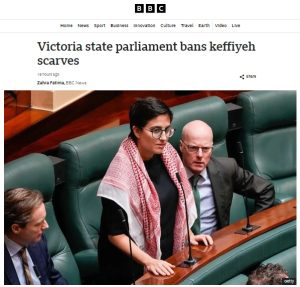|
Getting your Trinity Audio player ready...
|
By: Hadar Sela
On May 15th a report headlined “Victoria state parliament bans keffiyeh scarves” was published on the BBC News website’s ‘Australia’ page.
That report is credited to Zahra Fatima, who less than a week after the atrocities of October 7th was already promoting false claims of ‘genocide’ on social media.
Fatima’s report includes the following:
“The Nakba, which means “Catastrophe”, is commemorated by Palestinians every year on 15 May.
On 14 May 1948, Israel declared independence, and in a war which began the next day, up to 750,000 Palestinians who had lived on that land fled or were expelled from their homes.
Neither they nor their descendants have been allowed by Israel to return.”
The link offered to readers in that first paragraph leads to a BBC ‘backgrounder’ from exactly six years ago which was previously discussed here:
Fatima’s next two paragraphs are copied from that ‘backgrounder’ and once again no mention is made of the fact that the “war which began the next day” was the result of the attempt by multiple Arab countries to invade and destroy the newly declared Jewish state. As noted here back in 2018:
“As we see, according to both those accounts the displacement of Palestinians only began after Israel declared independence and the sole entity cited as being responsible for that displacement is “Israeli forces”.
Obviously both those accounts erase from audience view the fact that hostilities – and with them displacement of civilians – had in fact begun five and a half months earlier. The BBC’s portrayals make no mention of Arab rejection of the recommendations of the November 1947 UN Partition Plan, immediately after which Arab rioting ensued and Arab forces launched what the UN described at the time as “armed incursions” into what was then still Mandate Palestine.
In other words, the BBC has chosen to present Palestinians as totally passive victims, airbrushing the fact that their displacement came about after Arab leaders elected – at their own admittance – to launch hostilities.”
In contrast to Fatima’s inaccurate claim, the displacement of Palestinians did not begin only after Israel declared independence on May 14th 1948. In fact, by that date, roughly half of those who became refugees had already fled, in many cases due to instruction from their leaders.
Fatima’s airbrushed portrayal also includes the following:
“The black-and-white keffiyeh became associated with Palestinian identity during the late 1930s.”
By “the late 1930s” Fatima actually means the Arab Revolt of 1936 – 1939 when, according to Encyclopedia Britannica and others:
“…the keffiyeh was used to conceal the identities of protestors from authorities. When British authorities attempted to ban the keffiyeh, Palestinians wore the garment en masse as a show of unity, even in urban areas, where the keffiyeh gradually replaced the fez.”
As for the black and white colour scheme:
“The black-and-white pattern came in the 1950s, when British commander General John Glubb assigned it to Palestinian soldiers in the Arab Legion to distinguish them from the red-and-white of Jordanian soldiers, U.S. historian Ted Swedenburg wrote in his book “Memories of Revolt”.”
Once again we see how the BBC’s failure to correct online content is not only a disservice to BBC audiences but also leads BBC journalists to produce even more inaccurate and one-sided coverage in years to come.





